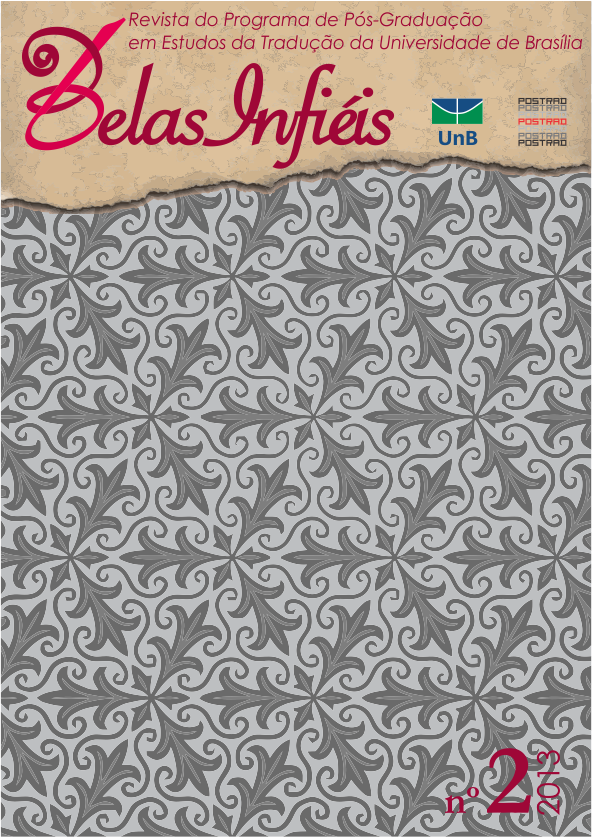RECEITAS CULINÁRIAS E TRADUÇÃO:
LIGAÇÃO ENTRE CULTURAS E CIÊNCIAS
DOI:
https://doi.org/10.26512/belasinfieis.v2.n2.2013.11240Palabras clave:
receitas, culinária, mundo árabe, tradução técnica, movimentos de traduçãoResumen
Este artigo discute receitas e literatura culinária do mundo árabe como ponto de partida para apontamentos sobre a tradução de receitas e de textos técnicos como forma de produção e disseminação de conhecimento. O trabalho apoia-se em características marcantes das receitas culinárias, do conhecimento grego da antiguidade e da cozinha árabe. Os objetivos do artigo são: (a) apresentar fatos sobre a origem da receita culinária, justificando a sua ligação com o conhecimento técnico; (b) ligar a culinária no mundo árabe com o conhecimento grego da antiguidade e com a tradução; e (c) estabelecer um paralelo entre dois movimentos de tradução ”“ Weltliteratur (literatura universal) de Goethe e a Casa da Sabedoria de al-Ma’mun ”“ tão distintos, mas tão semelhantes. Conclui-se que as receitas estão intimamente ligadas ao conhecimento técnico e que esse conhecimento é, e foi, fomentado pelos dois movimentos de tradução discutidos neste artigo.
Descargas
Citas
CRATO, Nuno. Da tradução à criação da ciência árabe. Disponível em < http://pascal.iseg.utl.pt/~ncrato/Expresso/CienciaArabe.pdf>. Acesso em 12 nov. 2013.
FIGUEROA, Uldaricio. El sistema internacional y los derechos humanos. Santiago: RIL editores, 2012.
JOHANNWolfgangvonGoethe(1749”1832)onWeltliteratur. Disponível em <http://mason.gmu.edu/~ayadav/Goethe%20on%20World%20Literature.pdf>. Acesso em 03 nov. 2013.
KESTLER, I. M. F.O conceito da literatura universal em Goethe.Disponível em: <http://revistacult.uol.com.br/home/2010/03/o-conceito-de-literatura-universal-em-goethe/>. Acesso em 4 nov. 2013.
LAURIOUX, Bruno. Cozinhas medievais, séculos XIV e XV. In: Jean Louis Flandrin; Massimo Montanari, História da Alimentação.Trad. Luciano Vieira Machado; Guilherme J. F. Teixeira.3ª. Ed. São Paulo: Estação Liberdade, 1998, pp.447-465.
LIEBMAN PARRINELLO,Giuli. Einblicke in die Textsortengeschichte: Kochrezepte seit frühneuhochdeutscher Zeit bis heute. In. KALVERKÄMFER, Hartwig, BAUMANN (Hrsg), Klaus-Dieter. Fachliche Textsorten: Komponenten -Relationen ”“Strategien. Tübingen, 1996.
LONGHIN-THOMAZI, S. R. Aquisição de tradições discursivas: marcas de uma escrita heterogeneamente constituída.Alfa Revista de linguística. v. 55. n. 1. 2011. Disponível em: <http://seer.fclar.unesp.br/alfa/article/view/4175/3773>. Acesso em 12 nov. 2013.
MAZZINI, Innocenzo. A alimentação e a medicina no mundo antigo. In: Jean Louis Flandrin; Massimo Montanari, História da Alimentação. Trad. Luciano Vieira Machado; Guilherme J. F. Teixeira.3ª. Ed. São Paulo:Estação Liberdade, 1998, pp.254-265.
PERRY, Charles.Foreword.In Zaouali, Lilia. Medieval Cuisine of the Islamic World: A Concise History with 174 Recipes. University of California,2007.
_____. Cooking with the caliphs. Saudi Aramco World. v. 57. n. 4. July/August 2006. Disponível em: <http://www.saudiaramcoworld.com/issue/200604/cooking.with.the.caliphs.htm>. Acesso em: 06 nov. 2013.
RIZZON, Carlos.Biblioteca: tempos e espaços de uma leitura. Disponível em: <http://www.unisc.br/portal/images/stories/mestrado/letras/coloquios/ii/biblioteca.pdf>. Acesso em 6 nov. 2013.
ROSENBERGER, Bernard.A cozinha árabe e a sua contribuição à cozinha europeia. In: Jean Louis Flandrin; Massimo Montanari, História da Alimentação. Trad. Luciano Vieira Machado; Guilherme J. F. Teixeira.3ª. Ed. São Paulo:Estação Liberdade, 1998, pp.338-358.
SILVA, A. M. Diccionario de lingua portuguesa recompilado dos vocabularios impressos ate agora, e nesta segunda edição novamente emendado, e muito acrescentado. Lisboa: Tipografia Lacerdina, 1813.
TEBEAUX, Elizabeth. (1993). Technical writing for women of the English Renaissance. Written Communication, 10:164-99.
TERESI, Dick. Lost discoveries: the ancient roots of modern science -from the Babylonians to the Maya. 2002. Disponível em: < http://books.google.com.br/books?id=pheL_ubbXD0C&printsec=frontcover&dq=science+translation+arabic&hl=pt-BR&sa=X&ei=NYqKUrHSD8npkAfb0IAI&ved=0CGUQ6AEwBjge#v=onepage&q=%20arabic&f=false>. Acesso em 18 nov. 2013.
TREFZER, Rudolf. Clássicos da literatura culinária: os mais importantes livros da história da gastronomia. São Paulo: Editora Senac. São Paulo, 2009.
TOLEDO, Rosana Fernandez Medina Toledo. Uma visão estética da gastronomia: uma formação docente. Revela. Ano IV -Nº VII -Jan/Abr 2010.
WAINES, David. Food Culture and Health in Pre-Modern Muslim Societies. Leiden: Koninklijke Brill NV, 2011.
Descargas
Publicado
Cómo citar
Número
Sección
Licencia
Copyright Statement
Given the public access to this journal, the texts are free to use but requires the recognition of the original authorship and initial publication in this journal to be properly stated.
The journal allows the use of works published for non-commercial purposes, including the right to submit the work to publicly accessible databases. Published contributions are the sole and exclusive responsibility of the author(s).
- When submitting papers to be evaluated by the Belas Infiéis journal, the author(s):
- Declare that the contents of the contributions are original and of their original creation, being entirely responsible for their content if there is an objection by third parties.
- Claim to be aware that they should not commit academic plagiarism.
- Declare that the manuscript has not been published, completely or partially, in Portuguese or another language. If it is a translation it should be submitted to the Translated Articles section.
- Declare that the manuscript is not being evaluated by other journals.
- Declare that the manuscript was not submitted to another journal simultaneously.
- Commit(s) to inform the journal of any kind of error or inaccuracy in their contribution (published, in evaluation or in editing) and to collaborate with the editors to make due corrections of the article (when in evaluation or editing) or erratum/retraction (after publication).
- Declare that there is no conflict of interest regarding the published work.
- Authorize its release if it is accepted for publication without any kind of monetary compensation.
- Agree to assign non-exclusive rights to publication to the magazine, remaining free to make their contribution available in other media as long as the publication of the first version in Belas Infiéis magazine is mentioned. They also authorize Belas Infiéis to assign their texts for reproduction in content indexers, virtual libraries and similar platforms.
- Maintain copyright and grant the journal the right of first publication, the work being licensed under theCreative Commons Attribution License.
- Is/Are allowed and encouraged to publish and distribute their work online after the editorial process, which may increase the impact and citation of the published work.
- Authorize the editorial team to make textual adjustments and to adapt the article to the publication rules, when necessary.



















